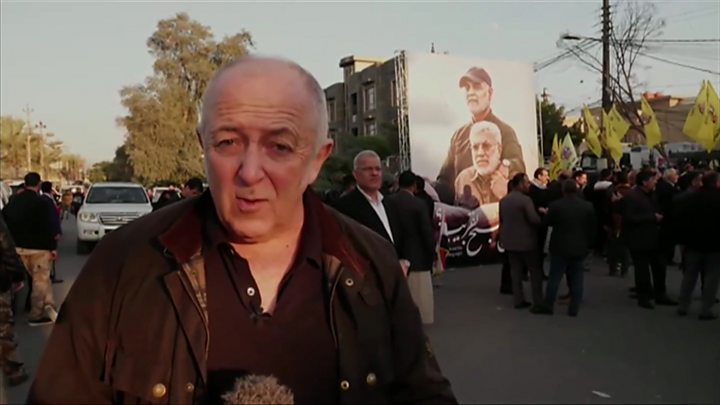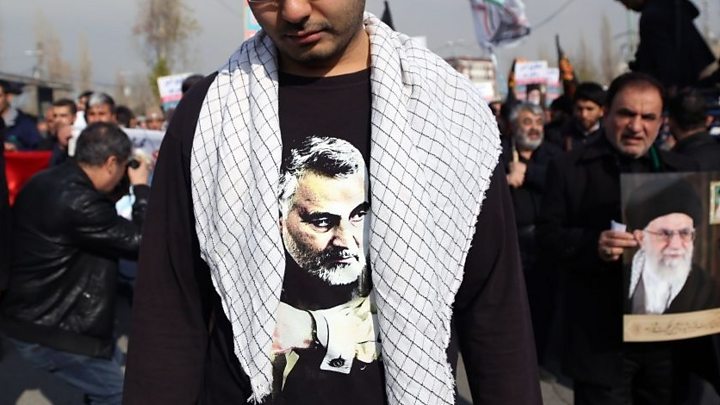At least 35 people have been killed in a stampede as Iranians flocked to the burial of a top commander killed in a US drone strike, Iranian media report.
The deaths led to the postponement of Qasem Soleimani's burial. A new time will be announced later, officials say.
Soleimani is being laid to rest in his hometown of Kerman with millions already estimated to have packed the streets for funeral processions.
His killing has raised fears of a conflict between the US and Iran.
Soleimani was widely considered the second most powerful man in Iran behind Supreme Leader Khamenei. The US saw him as a terrorist and a threat to American troops.
President Trump adopted a tough stance against Iran after his election and Tehran responded with their own campaign. Tensions were raised further last month after the US attacked an Iranian-backed militia in Iraq it blamed for attacks on US forces.
It is unclear what caused the stampede in Kerman, south-eastern Iran, but vast numbers of people were in the streets ahead of Soleimani's planned burial.
More than 48 others were injured, state media reported. Soleimani had been due to be buried on Tuesday morning.
In other developments:
- The US has reportedly denied a visa for Iranian Foreign Minister Javad Zarif to visit the UN in New York later this week. Such a move would apparently breach an agreement guaranteeing foreign officials access to the UN headquarters
- Speaking at a conference in Tehran Mr Zarif said the US had "gambled big and made a miscalculation" by assassinating Soleimani
- Germany is withdrawing a small number of soldiers stationed in Iraq as part of the coalition fighting Islamic State
- The US denied it was pulling out of Iraq after a letter from a US general suggested there would be a withdrawal
- Iranian parliamentarians have approved a motion designating the US Army and the Pentagon as terrorist organisations. It has also allocated extra funds for the force once headed by Soleimani
Soleimani's burial saw top Iranian officials renew their threats of revenge.
"The martyr Qassem Soleimani is more powerful... now that he is dead," said the Revolutionary Guards' top general, Major General Hossein Salami, told crowds in Kerman.
The Guards were set up to defend Iran's Islamic system and are a major political and military force.
 Jeremy Bowen in Baghdad: "There will be consequences" over death of Qasem Soleimani.
Mourners chanted "death to America" and "death to Trump", reporters there said.
"He [Soleimani] was seen as a great man who was ready to serve his people... He must certainly be avenged," an 18-year-old student who was there told the AFP news agency.
On Monday, Ayatollah Khamenei led prayers at Soleimani's funeral in Tehran, at one point weeping over his coffin.
Unconfirmed estimates from Iranian state television put the number who took to the streets of Iran's capital alone as "millions". The crowds were large enough they could be seen in satellite images.
Jeremy Bowen in Baghdad: "There will be consequences" over death of Qasem Soleimani.
Mourners chanted "death to America" and "death to Trump", reporters there said.
"He [Soleimani] was seen as a great man who was ready to serve his people... He must certainly be avenged," an 18-year-old student who was there told the AFP news agency.
On Monday, Ayatollah Khamenei led prayers at Soleimani's funeral in Tehran, at one point weeping over his coffin.
Unconfirmed estimates from Iranian state television put the number who took to the streets of Iran's capital alone as "millions". The crowds were large enough they could be seen in satellite images.
 Who was Qasem Soleimani?
But he was also a hardliner and a dominant force in a state that shot dead scores of protesters at the end of 2019.
Soleimani supported Syria's President Bashar al-Assad in the country's civil conflict, aided the Shia militant group Hezbollah in Lebanon, and guided Iraqi militia groups against the Islamic State group.
Justifying the strike President Trump said Soleimani was plotting "imminent" attacks on US diplomats and military personnel.
Who was Qasem Soleimani?
But he was also a hardliner and a dominant force in a state that shot dead scores of protesters at the end of 2019.
Soleimani supported Syria's President Bashar al-Assad in the country's civil conflict, aided the Shia militant group Hezbollah in Lebanon, and guided Iraqi militia groups against the Islamic State group.
Justifying the strike President Trump said Soleimani was plotting "imminent" attacks on US diplomats and military personnel.
 Jeremy Bowen in Baghdad: "There will be consequences" over death of Qasem Soleimani.
Mourners chanted "death to America" and "death to Trump", reporters there said.
"He [Soleimani] was seen as a great man who was ready to serve his people... He must certainly be avenged," an 18-year-old student who was there told the AFP news agency.
On Monday, Ayatollah Khamenei led prayers at Soleimani's funeral in Tehran, at one point weeping over his coffin.
Unconfirmed estimates from Iranian state television put the number who took to the streets of Iran's capital alone as "millions". The crowds were large enough they could be seen in satellite images.
Jeremy Bowen in Baghdad: "There will be consequences" over death of Qasem Soleimani.
Mourners chanted "death to America" and "death to Trump", reporters there said.
"He [Soleimani] was seen as a great man who was ready to serve his people... He must certainly be avenged," an 18-year-old student who was there told the AFP news agency.
On Monday, Ayatollah Khamenei led prayers at Soleimani's funeral in Tehran, at one point weeping over his coffin.
Unconfirmed estimates from Iranian state television put the number who took to the streets of Iran's capital alone as "millions". The crowds were large enough they could be seen in satellite images.
Who was Qasem Soleimani?
Soleimani was head of the Quds force, the overseas branch of the Revolutionary Guards. He was killed leaving Baghdad airport on Friday. In his homeland, Soleimani was hailed as a national hero. Who was Qasem Soleimani?
But he was also a hardliner and a dominant force in a state that shot dead scores of protesters at the end of 2019.
Soleimani supported Syria's President Bashar al-Assad in the country's civil conflict, aided the Shia militant group Hezbollah in Lebanon, and guided Iraqi militia groups against the Islamic State group.
Justifying the strike President Trump said Soleimani was plotting "imminent" attacks on US diplomats and military personnel.
Who was Qasem Soleimani?
But he was also a hardliner and a dominant force in a state that shot dead scores of protesters at the end of 2019.
Soleimani supported Syria's President Bashar al-Assad in the country's civil conflict, aided the Shia militant group Hezbollah in Lebanon, and guided Iraqi militia groups against the Islamic State group.
Justifying the strike President Trump said Soleimani was plotting "imminent" attacks on US diplomats and military personnel.
What has happened since his death?
Immediately after his death, Iran threatened retaliation. On Sunday, Iran declared it would no longer abide by any of the restrictions imposed by the 2015 nuclear deal. The deal limited Iranian nuclear capacities in exchange for the lifting of economic sanctions. Following warnings from Iran, Mr Trump said that the US would respond in the event of retaliation for Soleimani's death, "perhaps in a disproportionate manner". Trump administration officials though have contradicted the US president on his controversial threat to target Iranian cultural sites. Such acts could be considered war crimes and Secretary of Defence Mark Esper said, "we will follow the laws of armed conflict".DISCLAIMER: The Views, Comments, Opinions, Contributions and Statements made by Readers and Contributors on this platform do not necessarily represent the views or policy of Multimedia Group Limited.
Tags:
Latest Stories
-
Let go AFCON qualification woes and back Black Stars in World Cup qualifiers – Joseph Paintsil
2 minutes -
The US town where it’s the law to own a gun
12 minutes -
We must maintain the credibility of our electoral system – Dr. Bossman Asare
1 hour -
World Cup 2026: Support us in upcoming qualifiers – Ghana forward Joseph Paintsil to fans
1 hour -
WAEC to release 2024 WASSCE results by December 29 – Education Minister
2 hours -
Policy rate to fall to 22.5% in 2025 – Deloitte
2 hours -
Omane Boamah blasts ‘criminal and biased’ EC for justifying re-collation decision
2 hours -
UPSA alumnus files injunction against investiture of incoming VC
2 hours -
Cedi to end 2024, 2025 at GH¢16.07, GH¢17.23 to one dollar – EIU
3 hours -
How Salah’s stats rank among Premier League greats
3 hours -
Amorim questions ‘choices’ of Rashford’s advisors
3 hours -
2025 AFCON: It is a ‘shame’ Ghana did not qualify – Majeed Waris
3 hours -
NHIA refutes allegations of ongoing recruitment activities
3 hours -
Re-collation after Declaration of Results is not a New Thing in our Elections
3 hours -
2024 CHANQ: Agyemang-Badu wants Ghana to ‘go all out’ against Nigeria in second leg
3 hours

